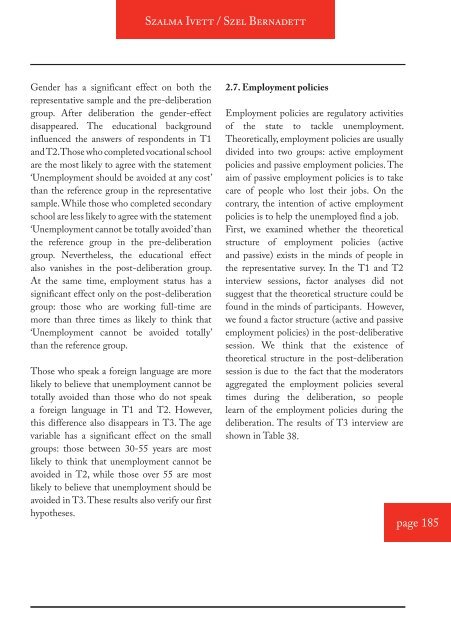Heft36 1 - SFB 580 - Friedrich-Schiller-Universität Jena
Heft36 1 - SFB 580 - Friedrich-Schiller-Universität Jena
Heft36 1 - SFB 580 - Friedrich-Schiller-Universität Jena
You also want an ePaper? Increase the reach of your titles
YUMPU automatically turns print PDFs into web optimized ePapers that Google loves.
SZALMA IVETT / SZEL BERNADETT<br />
Gender has a significant effect on both the<br />
representative sample and the pre-deliberation<br />
group. After deliberation the gender-effect<br />
disappeared. The educational background<br />
influenced the answers of respondents in T1<br />
and T2. Those who completed vocational school<br />
are the most likely to agree with the statement<br />
‘Unemployment should be avoided at any cost’<br />
than the reference group in the representative<br />
sample. While those who completed secondary<br />
school are less likely to agree with the statement<br />
‘Unemployment cannot be totally avoided’ than<br />
the reference group in the pre-deliberation<br />
group. Nevertheless, the educational effect<br />
also vanishes in the post-deliberation group.<br />
At the same time, employment status has a<br />
significant effect only on the post-deliberation<br />
group: those who are working full-time are<br />
more than three times as likely to think that<br />
‘Unemployment cannot be avoided totally’<br />
than the reference group.<br />
Those who speak a foreign language are more<br />
likely to believe that unemployment cannot be<br />
totally avoided than those who do not speak<br />
a foreign language in T1 and T2. However,<br />
this difference also disappears in T3. The age<br />
variable has a significant effect on the small<br />
groups: those between 30-55 years are most<br />
likely to think that unemployment cannot be<br />
avoided in T2, while those over 55 are most<br />
likely to believe that unemployment should be<br />
avoided in T3. These results also verify our first<br />
hypotheses.<br />
2.7. Employment policies<br />
Employment policies are regulatory activities<br />
of the state to tackle unemployment.<br />
Theoretically, employment policies are usually<br />
divided into two groups: active employment<br />
policies and passive employment policies. The<br />
aim of passive employment policies is to take<br />
care of people who lost their jobs. On the<br />
contrary, the intention of active employment<br />
policies is to help the unemployed find a job.<br />
First, we examined whether the theoretical<br />
structure of employment policies (active<br />
and passive) exists in the minds of people in<br />
the representative survey. In the T1 and T2<br />
interview sessions, factor analyses did not<br />
suggest that the theoretical structure could be<br />
found in the minds of participants. However,<br />
we found a factor structure (active and passive<br />
employment policies) in the post-deliberative<br />
session. We think that the existence of<br />
theoretical structure in the post-deliberation<br />
session is due to the fact that the moderators<br />
aggregated the employment policies several<br />
times during the deliberation, so people<br />
learn of the employment policies during the<br />
deliberation. The results of T3 interview are<br />
shown in Table 38.<br />
page 185
















